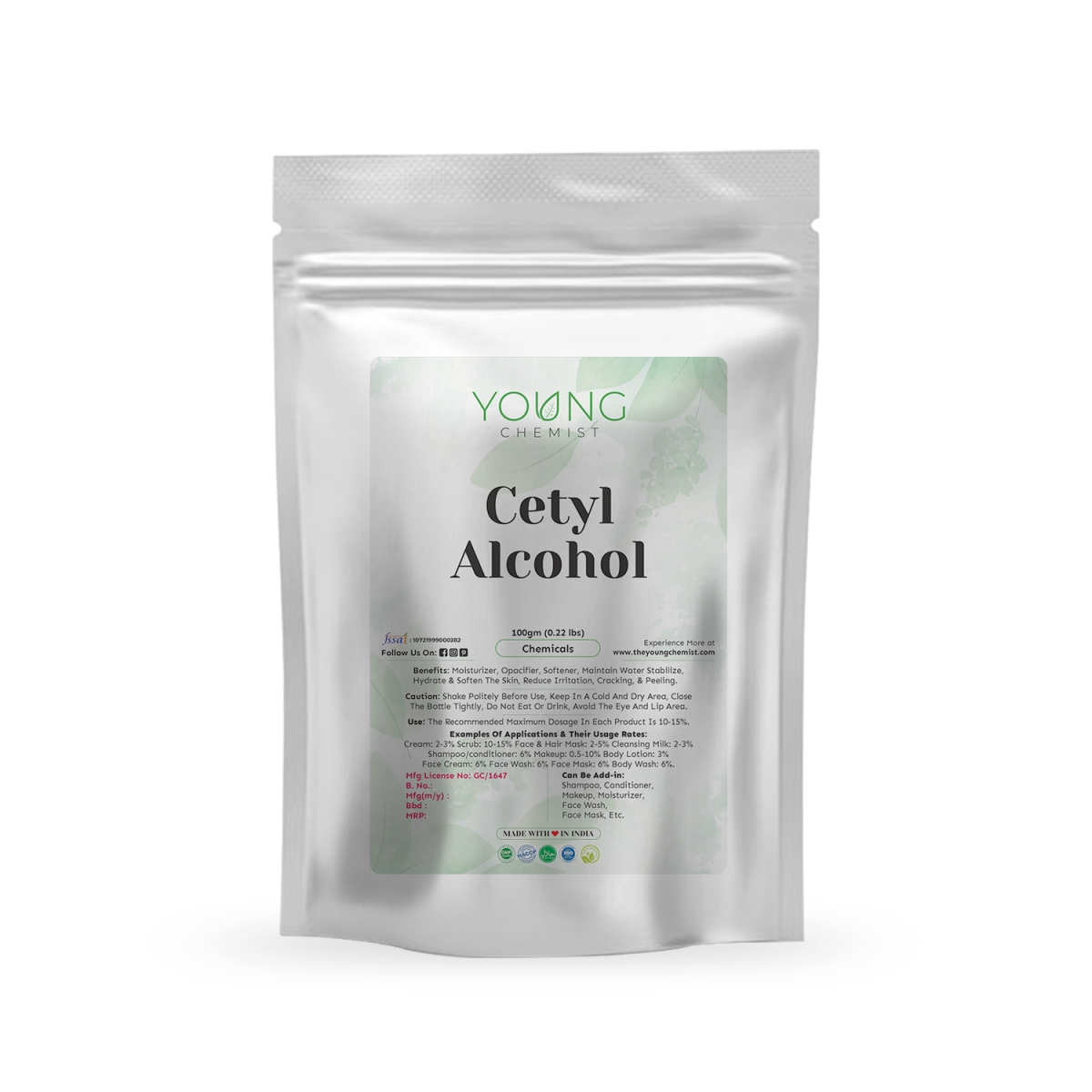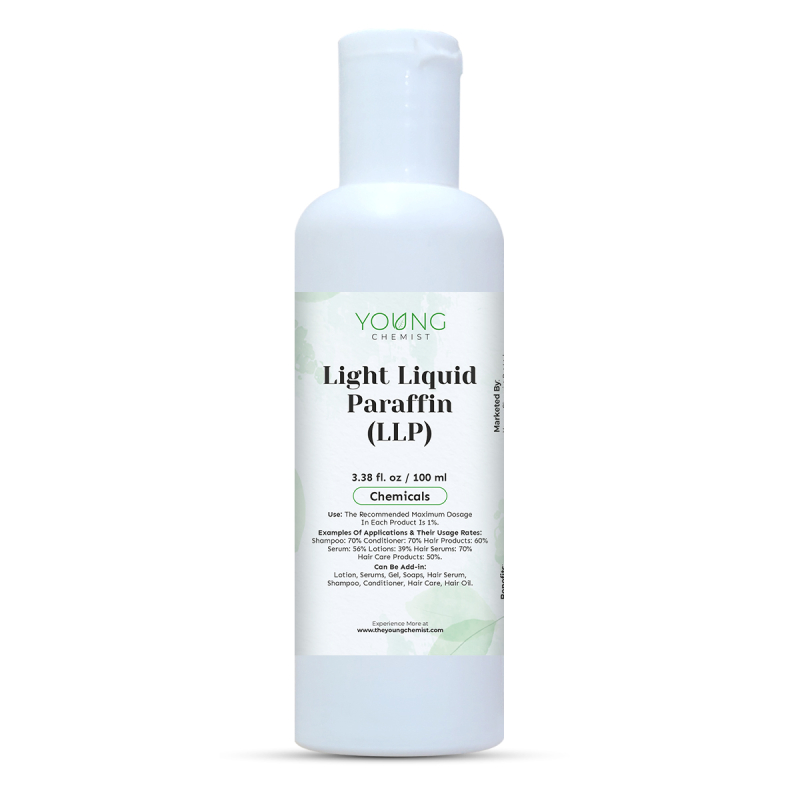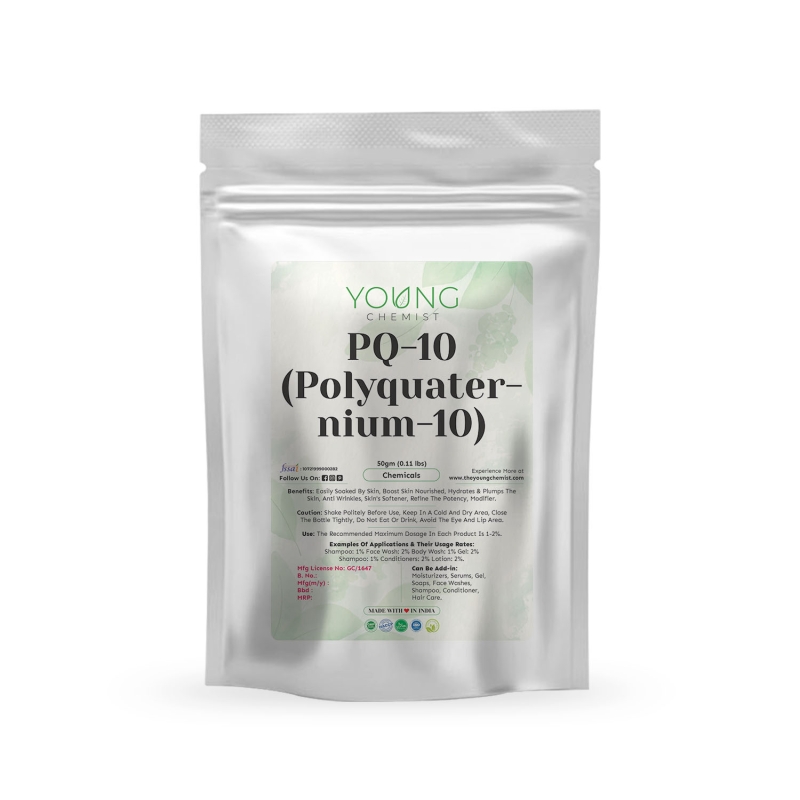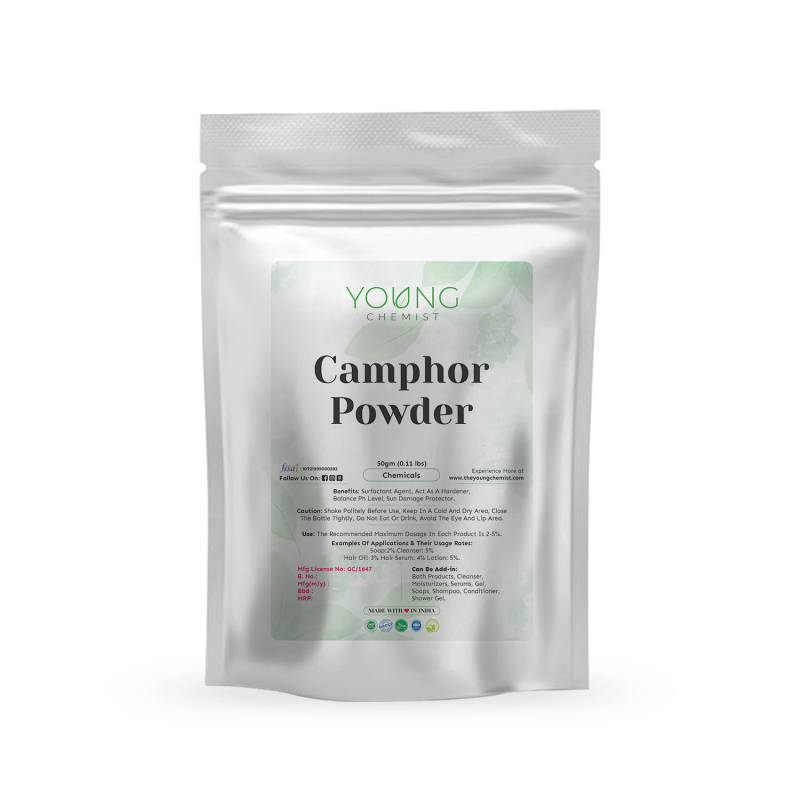-
No Item Added in Cart.

Cetyl Alcohol
SKU: CC-ADTV-CETYLALC
Size

40 customers are viewing this product



Young Chemist Cetyl Alcohol is a cosmetic chemical commonly used in skincare and hair care products. It is a fatty alcohol derived from natural sources such as coconut oil or palm oil. Here is a description of Cetyl Alcohol, its benefits, how to use it, and some cautions to keep in mind:
Cetyl Alcohol is a waxy substance that appears as a white, solid material. Despite its name, it is not the kind of alcohol that causes dryness or irritation. Instead, it belongs to the group of fatty alcohols, which are non-drying and non-irritating to the skin. Cetyl Alcohol has emollient properties, which means it helps to soften and smooth the skin and hair.
Cetyl Alcohol is a highly versatile fatty alcohol widely used in skincare, haircare, and cosmetic formulations for its exceptional ability to create smooth, creamy, and luxurious textures. Unlike drying alcohols, Cetyl Alcohol is a rich emollient, thickener, and stabilizer, helping products feel soft, silky, and deeply conditioning. It is commonly used in creams, lotions, conditioners, hair masks, body butters, balms, serums, and moisturizers, giving them a rich and elegant consistency that enhances user experience.
This multifunctional ingredient helps improve spreadability, slip, and product stability, ensuring that formulas remain uniform and long-lasting without separating. Cetyl Alcohol acts as a natural thickening agent, adding structure and body to formulations while also providing a velvety, non-greasy finish. Its moisturizing properties help soften the skin and condition the hair, making it ideal for dry, sensitive, damaged, or frizzy hair types.
In haircare, Cetyl Alcohol helps reduce tangles, enhances manageability, boosts shine, and delivers deep conditioning benefits. In skincare, it helps form a protective layer that locks in moisture, improves barrier function, and leaves the skin smooth and hydrated. Formulators love its stability, compatibility, and ease of use, making it a must-have ingredient for creating premium personal care products.
| Title | Description |
|---|---|
| No specifications available. | |
Cetyl Alcohol is primarily used as an ingredient in various cosmetic products. It is often found in creams, lotions, moisturizers, conditioners, and hair styling products. Follow the instructions provided by the specific product you are using, as the concentration and usage may vary.
Cetyl Alcohol is easy to incorporate and is usually added to the oil phase of formulations. Heat gently until fully melted before blending with other ingredients to ensure even distribution. Recommended usage levels range from 2% to 10% depending on the desired thickness and conditioning effect. It is ideal for creams, lotions, conditioners, balms, hair masks, body butters, and emulsions. Combine with other fatty alcohols or emulsifiers to achieve enhanced stability and a smoother texture. Cetyl Alcohol performs best in emulsified products, helping create rich, stable, and luxurious formulations with excellent texture and long-lasting moisture.
- Moisturizing: Cetyl Alcohol acts as a humectant, attracting and retaining moisture in the skin and hair, promoting hydration.
- Emulsifying Agent: It aids in the blending of oil and water-based ingredients in cosmetic formulations, helping to create stable and well-mixed products.
- Texture Enhancer: Cetyl Alcohol contributes to the luxurious texture and smoothness of creams, lotions, and conditioners, providing a pleasant sensory experience.
Cetyl Alcohol offers multiple benefits that make it a key ingredient in skincare, haircare, and cosmetic formulations. As a rich emollient and thickening agent, it helps create smooth, creamy, and luxurious textures. It enhances product spreadability, improves slip, and leaves the skin feeling soft, moisturized, and nourished. Cetyl Alcohol strengthens emulsion stability, preventing separation and extending shelf life. In haircare products, it provides deep conditioning, reduces frizz, improves detangling, and boosts hair softness and shine. Its gentle, non-irritating nature makes it suitable for sensitive skin. Cetyl Alcohol helps elevate product quality, making formulations feel premium and highly effective.
- Sensitivity: While Cetyl Alcohol is generally well-tolerated by most individuals, some people may be sensitive to it. If you have a known sensitivity or experience any adverse reactions such as redness, itching, or irritation, discontinue use and consult a healthcare professional.
- Purity: Ensure that the Cetyl Alcohol used in your products is of high quality and sourced from reputable manufacturers to minimize the risk of impurities.
- Other Ingredients: Pay attention to the complete ingredient list of a product containing Cetyl Alcohol, especially if you have known allergies or sensitivities to other ingredients.
It's always a good practice to perform a patch test before using a new product to check for any adverse reactions. If you have any specific concerns or conditions, it's recommended to consult a dermatologist or healthcare professional before incorporating products with Cetyl Alcohol into your skincare or hair care routine.
Product Questions
Cetyl Alcohol is a fatty alcohol derived from natural sources such as coconut or palm oil. It is widely used in skincare, haircare, and cosmetic formulations as an emollient, thickener, and stabilizer. Unlike drying alcohols, Cetyl Alcohol helps to soften, smooth, and moisturize the skin and hair while improving the texture and consistency of creams, lotions, conditioners, and serums.
Yes, Cetyl Alcohol is gentle, non-irritating, and safe for all skin types, even for sensitive and dry skin. It acts as a protective barrier that helps lock in moisture and prevents dehydration. Since it’s a fatty alcohol, it does not cause the dryness or irritation associated with regular alcohols like ethanol or isopropyl alcohol.
Cetyl Alcohol provides multiple skincare benefits. It enhances the texture and richness of creams and lotions, making them smooth and silky. It helps to retain skin moisture, prevents dryness, and creates a soothing, softening effect on the skin. Its emollient nature makes it ideal for hydrating products that need to nourish and protect the skin barrier.
Cetyl Alcohol helps make hair softer, smoother, and more manageable. It provides slip and lubrication, making detangling easier and reducing frizz. It also strengthens the hair shaft by locking in moisture, preventing dryness, and improving shine. This is why it’s commonly used in conditioners, hair masks, and leave-in treatments.
Cetyl Alcohol can be derived from both natural and synthetic sources. When obtained from coconut or palm oil, it is considered natural and plant-based. Many cosmetic brands prefer using naturally derived Cetyl Alcohol because it’s eco-friendly, sustainable, and suitable for clean beauty formulations. Always check the product label for its source if you prefer natural ingredients.
No, Cetyl Alcohol is non-comedogenic, meaning it does not clog pores or cause acne. In fact, it can help soothe and hydrate the skin without adding excess oil. It is often used in products for acne-prone or sensitive skin because it supports the skin barrier while maintaining a lightweight, non-greasy feel.
Cetyl Alcohol helps blend oil and water-based ingredients together, forming stable emulsions in creams and lotions. This ensures the product maintains its consistency and doesn’t separate over time. It also gives formulations a rich, creamy, and smooth texture, enhancing the overall sensory experience during application.
Cetyl Alcohol is a single fatty alcohol, while Cetearyl Alcohol is a blend of Cetyl and Stearyl Alcohols. Both perform similar functions, such as thickening and softening formulations, but Cetearyl Alcohol provides a slightly heavier texture. Cetyl Alcohol is often preferred for lighter, silkier creams or hair conditioners.
Yes, when derived from renewable sources like coconut or palm kernel oil, Cetyl Alcohol is considered eco-friendly and biodegradable. Many cosmetic manufacturers choose sustainably sourced Cetyl Alcohol that complies with RSPO (Roundtable on Sustainable Palm Oil) standards, helping reduce environmental impact.
Cetyl Alcohol is a fantastic ingredient for DIY cosmetic formulations. You can use it to create homemade creams, lotions, conditioners, and body butters. It helps emulsify oils and water, giving your recipes a smooth and luxurious texture. Typically, only a small percentage (2–5%) is required to achieve professional-quality results.

































